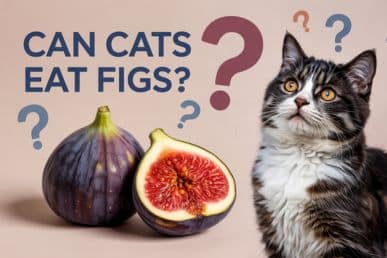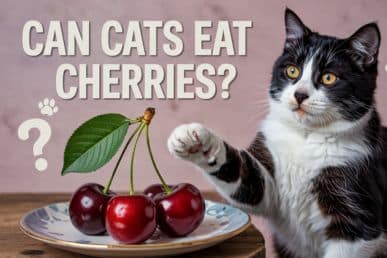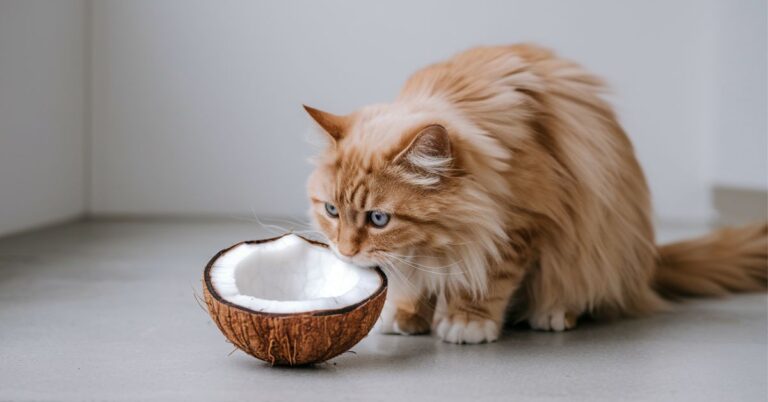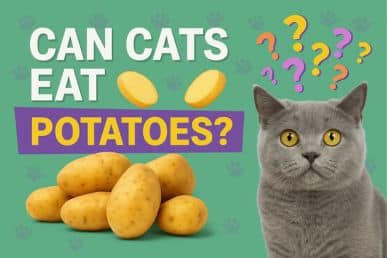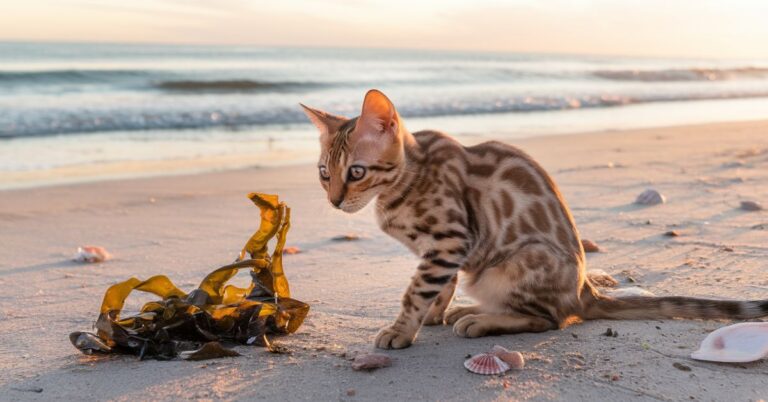Can Cats Eat Corn? What Vets Really Want You to Know
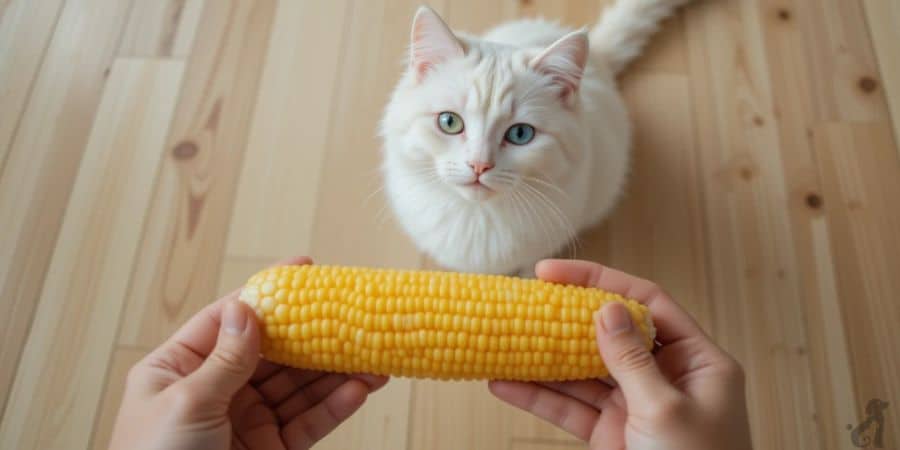
It’s a common question many cat owners find themselves wondering: since we share so much with our feline friends, can we share our corn too?
After all, humans enjoy this veggie in many different types of dishes – maybe on the cob, raw in salads, creamed, or even in chowder. But here’s the story: cats are natural hunters. Their bodies are built for meat as their primary food source.
So, feeding them corn isn’t something their bodies really need. However, you’ll often see corn listed as an ingredient in many cat food types. So, can cats eat corn safely?
The short answer is yes, a little bit of plain, cooked corn won’t harm them, but it’s definitely not necessary for their diet. It’s important to know the different ways corn is prepared and why it’s in their food.
In this article, we’ll explore whether corn is safe, nutritious, or unnecessary for your cat, and how to feed it properly — if at all.
Is Corn Good for Cats?
According to Dr. Sandra Mitchell, DVM, DABVP, a licensed veterinarian and contributor to PetMD, corn itself isn’t toxic to cats, meaning it won’t poison them if they sneak a bite.
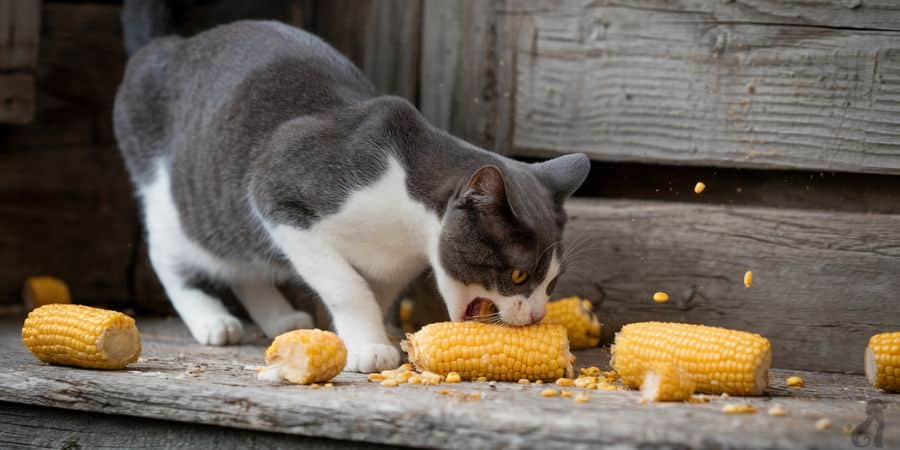
But is it actually good for them? Not really, and here’s why: cats are obligate carnivores. This fancy meaning just says their bodies are built to get almost all their key nutrients from meat!
They absolutely need meat-based protein and specific fatty acids found in animal sources to stay super healthy.
While you might see corn included in some cat food (usually as a processed filler or energy source), it’s difficult for most kitties to digest thoroughly— just like other starchy vegetables such as potatoes.
Their tummies just aren’t designed for breaking down plants like ours are. So, even if your cat seems to enjoy a nibble, corn isn’t very digestible or nutritious for them compared to meat.
The majority of what you feed your cat should be proper cat food designed to ensure they get those essential meat nutrients. Think of corn more like an occasional, tiny treat, not a useful part of their main food.
Can Corn Be Bad for Cats?
While a tiny bit of corn isn’t poison, it’s really not good food for your cats. The main issue is its low nutritional value for these animals – it’s mostly carbs offering empty calories they don’t need, which won’t help them stay healthy.
Eating too much can cause digestion problems like an upset tummy. Plus, if offered in large amounts or too regularly as a treat, all those extra calories can contribute to obesity and even lead to diabetes over time.
Repeated exposures might also trigger an allergic reaction in some sensitive kitties. So, corn definitely doesn’t qualify as a healthy choice and can contribute to health problems if they eat much of it.
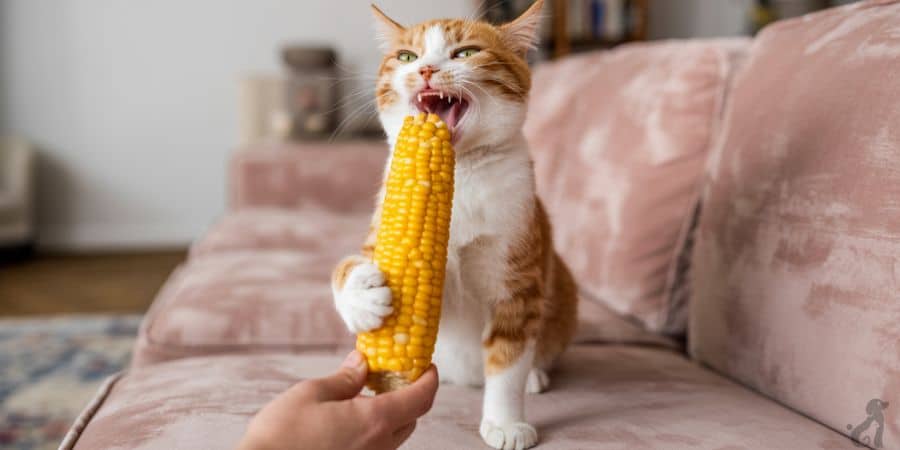
Potential Risks and Concerns
Digestive Challenges with Corn
While a tiny bit of plain corn might seem fine to give your cats, eating large amounts or the wrong parts poses real risks.
Cats struggle digesting plant matter like corn kernels because their gastrointestinal tract is built for meat. This can cause vomiting, diarrhea, or trouble passing stool. Sometimes, kernels pass whole in their feces.
Dangers of Corn Cobs and Husks
Worse, nibbling on cobs or husks is dangerous; these hard pieces can create blockages (obstructions) inside them, which might require surgical treatment to fix. It’s definitely not approved feeding.
Corn Allergies in Cats
Another concern is food allergies. While less common in cats than allergies to things like fish, chicken, dairy, or beef, some cats can be allergic to corn.
This allergy can manifest over time, showing up as itchy skin, inflammation, or constant itchiness, making your kitty uncomfortable.
Corn, Calories, and Cat Obesity
Corn is also a starchy source of calories. Regular feeding of corn-heavy foods can contribute to weight gain, making your cat obese.
Obesity significantly increases the risk of serious chronic health conditions like diabetes and painful arthritis. Sadly, carrying this extra weight often shortens a cat’s lifespan.
Harmful Additives and Unsafe Ingredients
Finally, be very careful about corn your cat might eat. Never let them have corn with added ingredients meant for people.
Things like garlic are highly toxic to cats. Butter, oils, salt, or seasonings can cause immediate gastrointestinal upset (like more vomiting or diarrhea) and also make obesity or existing chronic health conditions worse (exacerbation).
Only offer plain, unsalted, unbuttered corn if you do, and just a tiny bit. Remember, corn isn’t a natural food for them, especially here in the United States where we eat so much of it! Watch out for food poisoning risks from unsafe additives.
My Cat Just Ate Corn – Should I Be Worried?
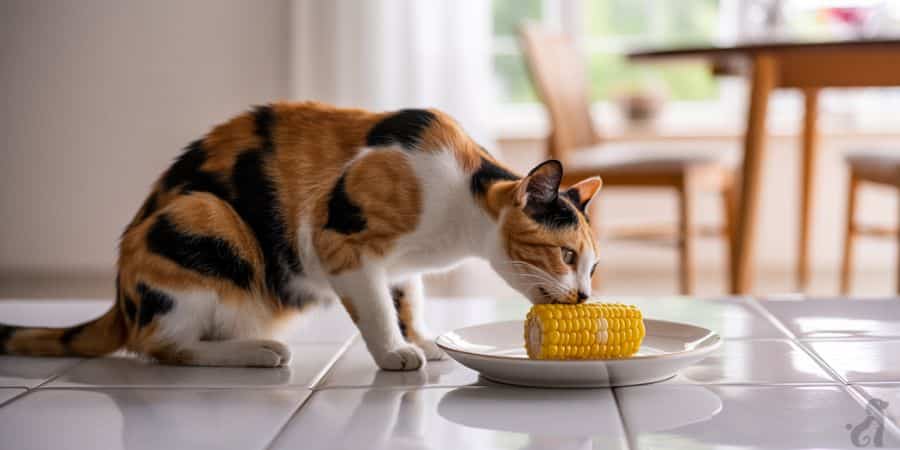
Take a deep breath! If your cat snuck just a small piece of corn, it’s unlikely to cause serious harm right away. While cats might eat corn sometimes, their digestive system isn’t really designed for it.
Think of corn as only an occasional, very small treat, not regular cat food. It’s best to avoid feeding corn regularly. Why? Because sometimes, even small amounts can lead to tummy troubles. Keep an eye on your pet after eating corn. If you see any of these issues:
- Vomiting
- Diarrhea
or if you’re just concerned about their health, contact your veterinarian. Especially if your cat experiences anything really worrying, call your pet emergency hotline right away. Always consult a vet if you’re unsure!
Corn in Cat Food
Corn as a Common Ingredient in Commercial Cat Food
You might notice corn listed as an ingredient on many commercial brands of cat food, sometimes even as a main ingredient.
This can seem odd because cats are obligate carnivores, meaning their bodies are built for a meat-based diet and they absolutely require nutrients found only in animal products, like taurine.
Concerns About Corn as a Filler
While cats don’t need a vegan diet, the idea of grains like corn being a big part of their diet might worry you, especially if media sources talk about cheap fillers. But is corn just filler?
Nutritional Value of Corn in Cat Diets
Actually, when properly included and processed in cat foods, corn offers real benefits. It’s a safe source of important energy from carbohydrates.
More importantly, it provides essential nutrients like essential fatty acids, including linoleic acid, which helps keep skin and fur healthy.
Digestibility and Health Benefits
Scientific research shows that processed corn is quite digestible for cats, meaning their bodies can break it down and use the nutrients.
While meat provides the majority of the crucial protein cats need, corn adds valuable energy and some essential fatty acids that benefit their overall health.
Choosing Quality Cat Food with Corn
So, when you’re shopping, seeing corn on the label isn’t necessarily bad. Good cat foods use it thoughtfully alongside plenty of meat. Look for foods clearly labeled as complete and balanced that list real meat sources first.
This ensures your cat gets all the essential nutrients they need from animal products, with corn providing helpful energy and fats. Many cats are happily fed commercial diets where corn is included as a useful part of the recipe.
Types of Corn That Are Safe or Unsafe

Can Cats Eat Corn on the Cob?
You might wonder if sharing your tasty corn on the cob with your kitty is okay.
The simple answer is no, cats should not eat whole corn on the cob. While plain cooked corn kernels themselves aren’t usually toxic in smaller pieces, the cob is a huge problem for cats and all feline friends.
The cob poses serious risks to their health. The biggest danger is the cob itself. It’s hard for a cat to properly chew and swallow, making it a major choking hazard.
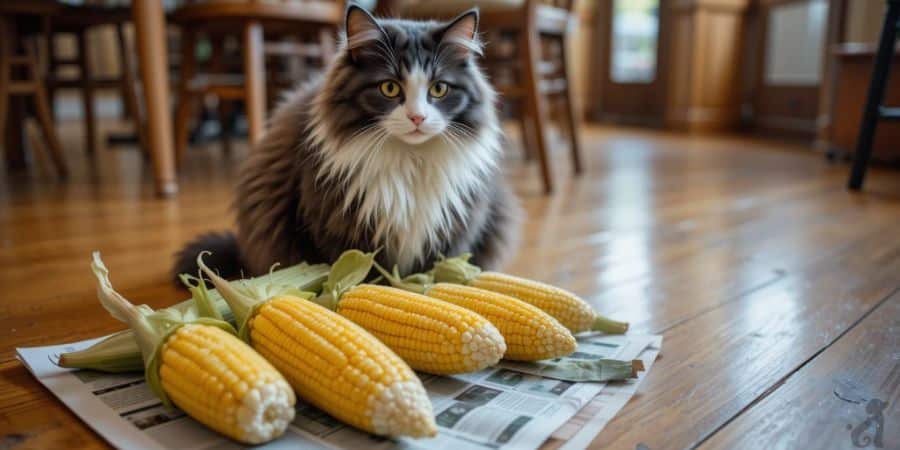
Even if your cat manages to gnaw off a piece and ingests it, that piece can get stuck in their digestive system. This creates an intestinal obstruction, a severe form of gastrointestinal blockage.
This obstruction is a life-threatening emergency that often requires emergency surgery to fix and remove the blockage. Never let your cat play with or chew on corn cobs! If you think your cat had accidental ingestion of cob, watch them very closely.
Symptoms of an illness like this obstruction include:
- Vomiting
- Diarrhea
- Acting very tired or lethargic
- Just not feeling well
Monitoring is crucial. If you see any of these signs or even just suspect your cat ate cob, call your veterinarian or an emergency animal hospital quickly. Don’t wait! Getting medical help quickly is vital.
Always follow your veterinarian’s advice and recommendations for treatment or if you need to visit the clinic. For plain corn as a food, only offer tiny, soft kernels (much smaller pieces than they could choke on) and only with your direct supervision.
Can Cats Eat Corn Husks?
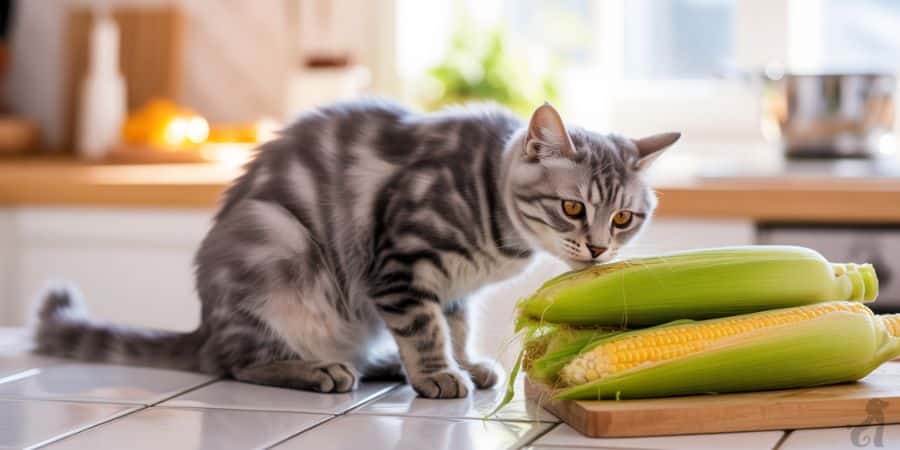
While cats might play with a fallen corn husk—maybe chew or bat it around—this isn’t safe. Husks are made of very tough fibers, a material that’s indigestible for felines.
If your kitty swallows pieces while playing, that rough stuff can irritate their delicate stomach and intestinal tract lining. Worse, it might clump together inside them, causing a dangerous gastrointestinal blockage instead of safely passing through.
This rough material often leads to serious tummy trouble. Watch for signs like vomiting, diarrhea, or obvious abdominal discomfort if you suspect your cat ate a husk. Always take the husk away quickly if you see your cat interacting with one.
Offer an appropriate cat toy instead for safe fun! If you’re worried your cat consumed a husk, getting veterinarian advice is crucial.
What Corn Snacks Are OK for Cats?
If your cat eats cooked corn in small amounts, it is safe for him, but if you have other corn-related products in your home, it is very important for you to know about the following things before feeding them to your cat:
Sweet Corn
- Cats can try sweet corn sometimes.
- Give only small amounts of plain, cooked kernels.
- Always have the corn removed from the hard cob first.
- Corn on the cob is a no-go because of the cob.
- Cooked kernels are one common forms offered.
- It’s safe for most cats as a tiny treat, not a meal.
Canned Corn
Can kitty eat canned corn? Plain corn itself isn’t bad, but the ingredients are the problem! Canned corn often has added salt – way too much salt for your cat. A tiny bit of plain corn is possible, but only if you:
- Rinse it thoroughly to remove extra salt.
- Never share a large amount.
It’s safest to avoid it entirely.
Cornbread
Sharing cornbread with your cat or kitty? While it’s a corn product, it’s not good for them. Why?
- Contains added ingredients like sugar, butter, and spices
- These can upset their tummy. Better not to share!
Popcorn
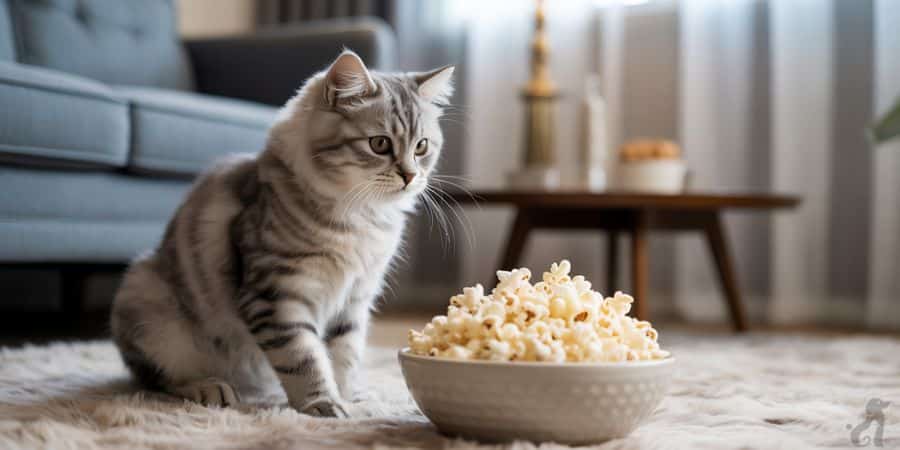
While your kitty probably finds popcorn exciting, it shouldn’t be offered as a snack. A piece dropped on the floor that your cat snags is OK, easily eaten.
But purposely feeding it is not safe! Its rough, sharp bits can result in choking or hurt their intestinal tract. Especially avoid popcorn with any toppings, including butter or salt.
Corn Chips
As mentioned earlier, corn itself isn’t toxic, corn chips are different. Their ingredients, like salt, fats, and spices, are bad for your cat. These things added can upset a cat’s digestive system and likely won’t sit well. It’s best to avoid giving them altogether.
Corn Tortillas
Corn tortillas or chips aren’t poisonous to cats, making them technically safe in tiny bites. However, they fall into the same “not good food” category. Why?
- High in carbohydrates but low in vital nutrients your cat needs.
- Additives and flavorings often used aren’t healthy.
Stick to cat food; don’t feed these regularly. Plain corn itself is likely safer, but tortillas aren’t ideal.
How Much Corn Can Cats Eat?
So, how much corn can your kitty safely have? Experience tells us cats don’t need corn nutritionally, but if your cat enjoys eating a tiny bit as a rare treat, keep it very small.
General advice is to limit it to a tablespoon or less of cooked, plain corn per week – definitely avoid any corn with butter or spices! Stick to fresh, plain kernels.
Why such tiny portions? While small amounts are usually okay for most cats, larger servings can cause negative side effects, like an upset tummy leading to vomiting or diarrhea. It’s simply not worth the risk for a food they don’t need.
How to Feed Corn to Cats?
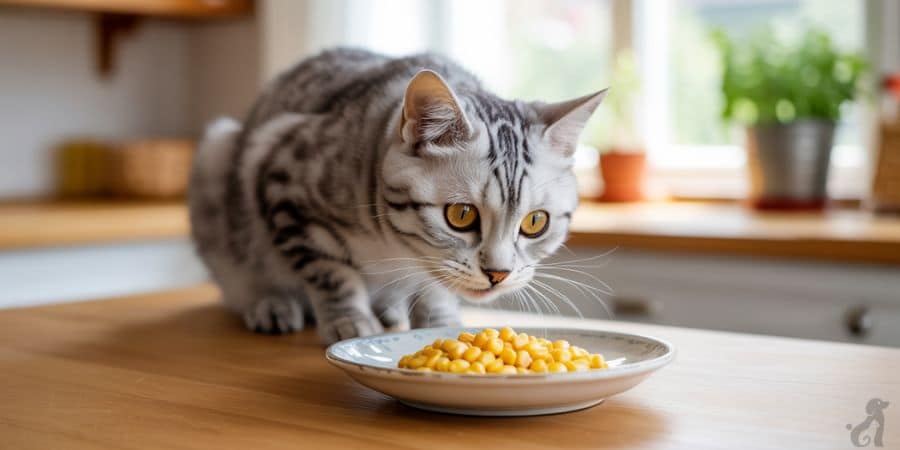
Okay, so your cat is curious about your corn? Remember, cats are obligate carnivores, meaning meat is their main food. Corn itself isn’t poisonous, but it shouldn’t replace their commercial cat diet. It offers little real nutrition for them.
If you want to share a tiny bit as a treat, make sure it’s plain, cooked corn – just a few kernels off the cob. Never add butter or spices; those can upset their tummy! This tiny treat might be beneficial for fiber, but it’s really just a sometimes snack.
Important! Always check with your veterinarian first, especially if your kitty has a chronic health condition like diabetes or known food allergies. NEVER give them corn cobs or corn husks.
These are a huge choking hazard and can cause a dangerous gastrointestinal blockage. If swallowed, your cat could need emergency surgery to remove it. Stick to safe, plain kernels very occasionally.
Alternatives to Corn for Cats
Instead of giving your cat corn, which really isn’t a good food for them, think about alternatives that are much better. Many common human foods make safer treats.
You can feed small bits of cooked, plain foods like chicken, turkey, fish (like salmon), eggs, bananas, blueberries, pumpkin, strawberries, broccoli, sweet potatoes, or peas. These offer better nutrition than corn.
According to Dr. Rhiannon Koehler, DVM, MPH, a licensed veterinarian and contributor to The Spruce Pets, these treats shouldn’t comprise more than 10% of your cat’s daily caloric intake – their main food should be commercial cat food formulated specifically for them.
Always consider checking with your veterinarian before feeding any new food to your cat. Cat treats bought from the store are also a simple idea, as they are approved for feline diets.
The key idea is to feed cats food meant for cats, not fillers like corn. Consider these options instead to keep your furry friend healthy!
Conclusion
So, is corn actually safe for your cat? Generally, yes, it’s not poisonous. Think of corn like a tiny, unimportant ingredient sneaking into your cat’s world. Many commercial cat foods include a little corn because it’s cheap filler.
While giving your cats a tiny piece as a very rare treat might be okay sparingly, it’s best just to think about skipping it altogether.
Why? Because corn does nothing special for them! Cats are hunters! Their bodies need proper nutrition only meat-based food can provide. A balanced, complete cat diet is formulated specifically to meet all their health needs.
Always ensure their main food is high-quality cat food packed with meat. That’s the best way to keep them truly healthy and happy. Corn just doesn’t help them one bit.
Frequently Asked Questions:
Is it safe for my cat to eat corn?
Cats can eat corn safely. Your cat eating a little is fine. It’s a fact that commercial cat foods commonly used corn as a filler ingredient. This is probably due to its availability and fiber content. Don’t make it a daily basis though.
Can Kittens Eat Corn?
Corn isn’t inherently toxic for kittens, but it’s best avoided. Their tiny stomachs are sensitive and can’t digest it properly. Kittens need food packed with essential nutrients for healthy growth – corn doesn’t offer that.
How much corn can a cat have?
Cats tolerate sweetcorn, but it’s not ideal cat food. Offer only a teaspoon or less at a time. Eating more much more often isn’t good. Limit it to twice a week max. It’s high in sugar, so much more could cause weight gain. Plus, it might make them feel full without needed nutrients.
Is corn meal ok for cats?
Cornmeal isn’t toxic for cats, meaning a small amount your cat consumes occasionally is unlikely to cause harm. However, it doesn’t provide the essential nutrients cats need. Cats have specific nutritional requirements. Always prioritize high-quality cat food as their regular diet. This part of their food meets their nutritional requirements best.
Is corn hard to digest for cats?
Cats are meat-eating animals and don’t need corn. Corn contains carbs that might cause digestion problems for your cat. A large amount over time can lead to obesity and even contribute to diabetes. Also, repeated exposures might make a cat become allergic.
Why does my cat like eating corn?
Cats might enjoy corn for its sweetness. While high in carbohydrates, it offers fiber. This fiber improves stool consistency, aiding bowel movements and reducing constipation risk. It helps control blood sugar (glycemic control), benefiting both digestion and overall health.
Why is corn in every cat food I see?
Brands often add corn to cat food because it’s affordable, relatively inexpensive, and a quick source of carbohydrates. It’s used to make more bulk, and especially included for simple, money-saving reasons.

